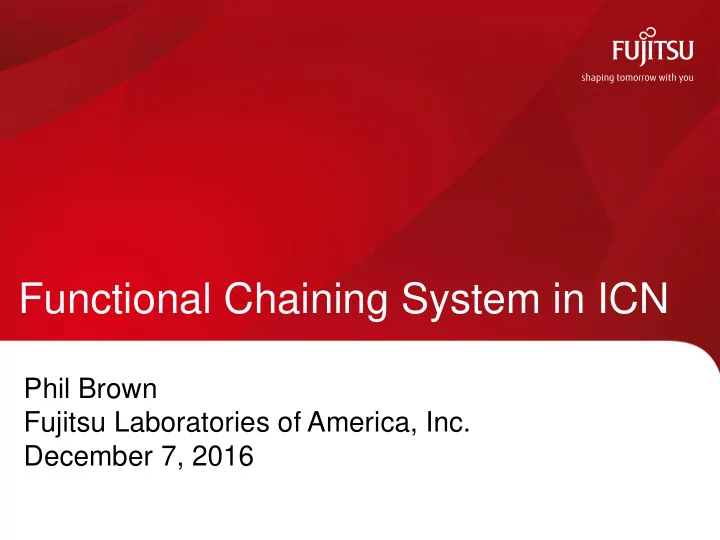

Functional Chaining System in ICN Phil Brown Fujitsu Laboratories of America, Inc. December 7, 2016
Functional Chaining demo setup 2
Routing optimization 3
In-network caching 4
Whole-chain security /video_compression/ … /video_combination/.. /video_clips/.... Content 3 (compressed video) Content Content 2 (hash of combined video & header) stack Content 1 (multiple hashes of raw video clips & header ) Signature 3 /video/compression/key/3 Signature Signature 2 /video/combiner/key/2 Signature 1 (including multiple signatures and keys) stack /user/Alex/key/1 /user/Bob/key/1 /user/Charlie/key/1 5
Path Search-Similar users optimal vs edge caching 𝑑 𝑗 𝑑 𝑡 limited link capacity 𝜇𝐶 =.8, 𝜇𝐶𝑆 =.6 For small α more storage at core is optimum, so the cost reduction improvement comparing to only edge caching is bigger (20-30%) 6
Background Differences with NFN (Named Function Networking) 7
NFN processing procedure NFN uses a 3-phase strategy, i.e., upstream fetch, separate code and data fetch, and computation push, to process a functional chaining request 8
NFN Assume we have a chain of function applications f(g(h(data))): NFN encodes it as |data|h|g|f Phase 2 of NFN (separate code and data fetch): An Interest is firstly forwarded to an NFN-capable router, which can divide the Interest to fetch multiple data and functions (codes). After that, data can be processed at the NFN-capable router and returned back to the consumer. NFN-capable NDN Router Router NDN Router Data Interest (|data|h|g) Interest (|data|h|g) Interest (data) Data (|data|h|g) Data (|data|h|g) Data (data) Interest (g) Data (g) Function h Function g NDN Router NDN Router 9
Summary Differences Naming Interest & Data processing procedure Functional chaining forwarding strategy Whole chain security 10
Recommend
More recommend